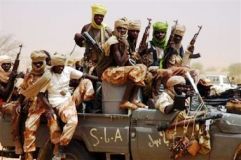Darfur rebel factions fighting threatens to unleash ethnic violence
July 27, 2006 (WASHINGTON) — Spreading clashes between rebel factions in Sudan’s western region of Darfur are threatening to unleash an ethnic conflict, United Nations officials, African Union officers and refugees said.
 Forces loyal to rebel leader Minni Minawi in the past month have overrun North Darfur villages inhabited by the Fur people, Darfur’s largest ethnic group, which mainly supports a rival rebel faction headed by Abdelwahid Mohamed al-Nur.
Forces loyal to rebel leader Minni Minawi in the past month have overrun North Darfur villages inhabited by the Fur people, Darfur’s largest ethnic group, which mainly supports a rival rebel faction headed by Abdelwahid Mohamed al-Nur.
Minawi, from the minority Zaghawa tribe, in a telephone interview yesterday, said he told President George W. Bush at a July 25 meeting in Washington that his troops weren’t attacking civilians. Minawi and the Sudanese government in May signed a peace agreement that was rejected by Nur’s faction in the Sudan Liberation Army.
“People fear it’s becoming more an inter-tribal conflict,” Cate Steains, the head of the Protection Unit of the UN Mission in Sudan in Darfur, said in a July 26 interview in Al-Fasher, capital of North Darfur. “The situation has deteriorated significantly. The level of fighting, the level of attacks and the level of displacement.”
A three-year war in Darfur between the government and SLA rebels killed tens of thousands of civilians and forced about 2.5 million from their homes in what the UN calls the world’s worst humanitarian crisis. The U.S. accused Sudan’s government and its militia allies, known as the Janjaweed, of committing genocide in Darfur.
While government and Minawi’s forces have stopped fighting each other, Minawi’s faction is battling Nur’s soldiers and a smaller rebel group known as the Justice and Equality Movement (JEM), said Major General Collins Ihekire, the commander of the African Union’s 7,000 soldiers in Darfur.
JANJAWEED TACTICS
Refugees from the recent fighting who live in grass huts outside the town of Tawilla described raids by Minawi’s Zaghawa kinsmen using tactics reminiscent of the Janjaweed.
“The Zaghawa came with cars and some riding camels and horses and attacked us,” said Hawa Ibrahim Sala, a 57-year-old mother of six who arrived in Tawilla a week ago from a village about 10 miles (16 kilometers) to the north. “They looted our camels, our clothes, our food and beat us with sticks.”
Those displaced by the fighting have reported beatings, rapes and abductions of men between the ages of 18 and 40 and killings of others, said Steains.
Minawi, speaking in a telephone interview from Washington yesterday, denied his troops were guilty of such atrocities.
“Certain allegations have been made and are not true,” Minawi said. “I explained to President Bush that we are defending ourselves and he said you have the right to protect yourself but don’t attack civilians.”
SUPPLY LINES
The latest fighting in North Darfur centred on the village of Korma, which has been controlled by both Minawi’s and Nur’s forces since March.
After Nur’s faction captured Korma in June, Minawi’s fighters responded by targeting Fur villages throughout the area in an attempt to cut off Nur’s supply line, according to an African Union report.
For villagers living in the area, it was further evidence that the Darfur peace agreement, mediated by the African Union and the U.S., has failed to end the fighting.
“After the signing of the agreement our life has become worse than before,” said Abakar Mohamed, a 44-year-old sheikh, or village leader who fled to Tawilla July 17. “Before, the two SLA groups were united, but because one side signed and other didn’t, now they are coming to attack us and loot our goods.”
PRIMORDIAL INSTINCTS
Nur’s decision not to sign the peace agreement has convinced most Fur civilians to reject it.
“They are following primordial instincts,” Major General Ihekire, the commander of the African Union’s contingent, said in an interview yesterday. “They don’t even want hear about it or see it, to hear alternative views that can convince them that this document is good.”
Nur wants changes to the peace accord to provide more political appointments for Darfurians, stronger guarantees about the disarmament of pro-government militias and greater compensation for war victims.
The refugees at Tawilla also said they need UN troops to be deployed in Darfur to protect them.
Sudanese President Omar Hassan al-Bashir has so far rejected calls by UN Secretary General Kofi Annan, the African Union and President Bush to permit the deployment of as many as 15,000 UN peacekeepers in Darfur.
“As long as it is two military factions fighting each other, it is one thing,” said Steains of the UN. “But once you get to the state that it is the people who have enormous animosity towards people of another group, this is where things can get very much out of control.”
(Bloomberg/ST)
